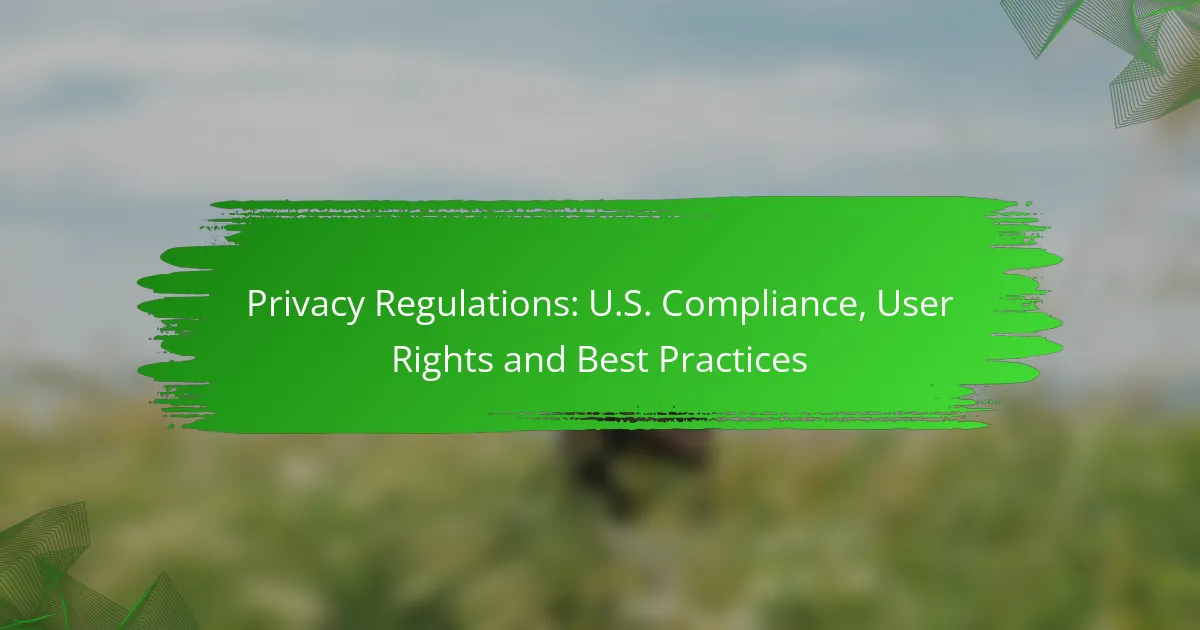In the U.S., privacy regulations are designed to safeguard consumer data and promote transparency in how businesses manage this information. These laws grant individuals specific rights regarding their personal data, while imposing responsibilities on companies to ensure compliance through structured processes and best practices. Understanding these regulations, such as the CCPA and VCDPA, is essential for both businesses and consumers to navigate the evolving landscape of data privacy.

What are the key privacy regulations in the U.S.?
The key privacy regulations in the U.S. focus on protecting consumer data and ensuring transparency in data handling practices. These laws establish rights for individuals and impose obligations on businesses regarding data collection, use, and sharing.
California Consumer Privacy Act (CCPA)
The California Consumer Privacy Act (CCPA) grants California residents specific rights regarding their personal information. Under the CCPA, consumers can request disclosures about the personal data collected, request deletion of their data, and opt out of the sale of their information.
Businesses must comply with these requests and provide clear privacy notices. Non-compliance can result in penalties, making it crucial for companies operating in California to implement robust data management practices.
Health Insurance Portability and Accountability Act (HIPAA)
The Health Insurance Portability and Accountability Act (HIPAA) protects sensitive patient health information from being disclosed without the patient’s consent. HIPAA applies to healthcare providers, insurers, and their business associates, requiring them to maintain the confidentiality and security of health data.
Covered entities must implement safeguards and provide training to employees on data privacy. Violations can lead to significant fines and legal repercussions, emphasizing the need for strict adherence to HIPAA regulations.
Children’s Online Privacy Protection Act (COPPA)
The Children’s Online Privacy Protection Act (COPPA) aims to protect the privacy of children under 13 years old online. It requires websites and online services directed at children to obtain verifiable parental consent before collecting personal information.
Organizations must provide clear privacy policies and allow parents to review and delete their child’s information. Non-compliance can result in hefty fines, making it essential for businesses targeting children to understand and implement COPPA requirements.
Gramm-Leach-Bliley Act (GLBA)
The Gramm-Leach-Bliley Act (GLBA) mandates financial institutions to explain their information-sharing practices to customers and to safeguard sensitive data. This law requires institutions to provide privacy notices and allow consumers to opt out of certain information-sharing practices.
Financial entities must implement security measures to protect consumer data from unauthorized access. Failure to comply can lead to enforcement actions and penalties, highlighting the importance of transparency and security in financial services.
Federal Trade Commission Act (FTC Act)
The Federal Trade Commission Act (FTC Act) prohibits unfair or deceptive acts or practices in commerce, including misleading privacy policies. The FTC actively enforces privacy regulations and can take action against companies that fail to protect consumer data adequately.
Businesses must ensure that their privacy practices align with their stated policies and that they implement reasonable security measures. Companies should regularly review their practices to avoid potential violations and maintain consumer trust.

How can businesses ensure compliance with U.S. privacy regulations?
Businesses can ensure compliance with U.S. privacy regulations by implementing structured processes that address data protection and user rights. This includes conducting audits, establishing clear policies, training staff, and utilizing appropriate software tools.
Conduct regular privacy audits
Regular privacy audits are essential for identifying compliance gaps and assessing data handling practices. These audits should evaluate how personal data is collected, stored, and shared, ensuring alignment with regulations like the CCPA or GDPR.
Businesses should schedule audits at least annually, but more frequent checks may be necessary for organizations handling sensitive information. Documenting findings and action plans can help track improvements over time.
Implement data protection policies
Establishing robust data protection policies is crucial for compliance. These policies should outline how personal data is managed, including data collection, usage, storage, and sharing protocols.
Policies must be clear and accessible to all employees. Regularly reviewing and updating these policies ensures they remain relevant and effective in addressing evolving regulations and business practices.
Train employees on privacy practices
Training employees on privacy practices is vital for fostering a culture of compliance. Employees should understand the importance of data protection and their specific responsibilities regarding personal information.
Consider implementing regular training sessions and providing resources such as handbooks or online modules. This ensures that all staff members are aware of best practices and the consequences of non-compliance.
Utilize privacy management software
Privacy management software can streamline compliance efforts by automating data tracking and reporting. These tools help businesses manage consent, monitor data access, and ensure adherence to privacy regulations.
When selecting software, consider features such as data mapping, incident response management, and user-friendly dashboards. Investing in the right tools can significantly reduce the administrative burden associated with compliance efforts.

What are user rights under U.S. privacy laws?
User rights under U.S. privacy laws include the ability to access, delete, and control personal information held by businesses. These rights vary by state and are influenced by regulations such as the California Consumer Privacy Act (CCPA) and the Virginia Consumer Data Protection Act (VCDPA).
Right to access personal data
The right to access personal data allows individuals to request and obtain information about the personal data that businesses collect about them. This includes details on the types of data collected, the purpose of collection, and any third parties with whom the data is shared.
To exercise this right, users typically need to submit a formal request to the business, which may require verification of identity. Businesses are generally required to respond within a specific timeframe, often around 45 days.
Right to delete personal information
The right to delete personal information enables individuals to request the removal of their data from a business’s records. This right is particularly relevant for users who no longer wish for their data to be stored or used by a company.
When making a deletion request, users should ensure they follow the business’s specified process, which may include identity verification. Businesses are usually obligated to comply unless they have legitimate reasons to retain the data, such as legal obligations.
Right to opt-out of data sales
To opt-out, users can typically find a designated link on the business’s website. It’s important for consumers to regularly check their preferences, as businesses may update their data practices or policies.
Right to data portability
The right to data portability gives individuals the ability to obtain their personal data in a structured, commonly used format, allowing them to transfer it to another service provider. This right promotes user control over personal information and encourages competition among businesses.
When requesting data portability, users should specify the format they prefer, such as CSV or JSON. Businesses are generally required to comply with these requests, but the specific format may depend on the data type and the capabilities of the receiving service.

What best practices should businesses adopt for privacy compliance?
Businesses should adopt best practices that prioritize transparency, user rights, and data protection to ensure compliance with privacy regulations. Key strategies include clear privacy notices, data minimization, regular policy updates, and transparent data practices.
Establish clear privacy notices
Clear privacy notices inform users about how their data will be collected, used, and shared. These notices should be easily accessible and written in plain language, avoiding legal jargon that can confuse users.
Include essential information such as the types of data collected, the purpose of data processing, and users’ rights regarding their information. Regularly reviewing and updating these notices is crucial to reflect any changes in data practices or regulations.
Implement data minimization strategies
Data minimization involves collecting only the information necessary for a specific purpose. This reduces the risk of data breaches and enhances user trust. Businesses should evaluate their data collection practices and eliminate any unnecessary data fields.
For example, if a business only needs an email address for communication, it should not request additional personal information unless absolutely necessary. This approach not only complies with regulations but also streamlines data management.
Regularly update privacy policies
Regular updates to privacy policies ensure that they remain compliant with evolving regulations and accurately reflect current practices. Businesses should schedule periodic reviews, ideally at least annually, to assess their policies.
When updating policies, communicate changes to users clearly and promptly. Highlight significant modifications, such as new data processing activities or changes in user rights, to maintain transparency.
Engage in transparent data practices
Transparency in data practices builds trust with users and fosters compliance with privacy regulations. Businesses should openly communicate their data handling practices, including how data is stored, processed, and shared with third parties.
Consider implementing user-friendly tools that allow individuals to access, modify, or delete their data easily. Providing clear channels for user inquiries about data practices can further enhance transparency and user confidence.

What are the penalties for non-compliance with privacy regulations?
Penalties for non-compliance with privacy regulations can vary significantly depending on the specific law and jurisdiction. In the U.S., businesses may face substantial fines, legal actions, and reputational damage if they fail to adhere to privacy standards.
Fines under CCPA
The California Consumer Privacy Act (CCPA) imposes fines ranging from $2,500 for unintentional violations to $7,500 for intentional breaches per incident. Companies can accumulate these fines quickly, especially if multiple violations occur, leading to significant financial repercussions.
Additionally, businesses may be required to pay for damages incurred by consumers due to non-compliance, further increasing the financial burden. It is crucial for organizations to implement robust compliance programs to avoid these penalties.
Legal actions and lawsuits
Non-compliance with privacy regulations can lead to legal actions from both consumers and regulatory bodies. Under the CCPA, individuals have the right to sue companies for data breaches, which can result in costly settlements or judgments.
Moreover, state attorneys general can initiate lawsuits against businesses for violations, potentially leading to additional fines and enforcement actions. Companies should prioritize compliance to mitigate the risk of legal challenges and protect their reputation.










